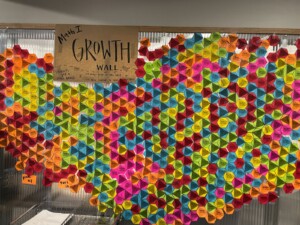Scaling Competency-Based Education: Equity-Focused Strategies for Policy and Practice

By: Tom Vander Ark and Mary Ryerse
“Competency systems can produce more equity, but only if we’re really intentional about making equity a goal. Unless we drive more time and support to students that need it, a competency system could actually be less equitable—it could advantage students that… are historically well-served,” Tom argues in this week’s episode of the Getting Smart Podcast. At the same time, David Ruff of Great Schools Partnership reflects that “When I think about competency and why we’re so committed to it, it’s really an equity agenda—it’s the only practice I know of that can actually deepen learning and lead to greater equity.”
Our recent landscape analysis (commissioned by XQ), Show What You Know: A Landscape Analysis of Competency-Based Education, found widespread interest in these ideas. We found that more schools are measuring student success by competency, which can help students take responsibility for their own learning, experience deeper learning, and develop the habits of lifelong learners. And new resources and tools, including blockchain technology and machine learning, could make the path to quality easier for educators.
But, as XQ highlights in the foreword to our report, “despite recent progress, significant challenges continue to impede widespread adoption of competency-based approaches and models.” Barriers include inadequate support for teachers and students, a lack of sufficient tools and resources, and the need for more descriptive transcripts to be accepted by postsecondary institutions.
Perhaps the most pervasive barrier is that, in many schools and districts, the system remains stuck in conventional routines and definitions that have changed little in decades. Schools are also stuck with tools and resources designed for a more static system, and with college admissions requirements and state accountability systems that reinforce old expectations and make change feel risky to teachers, parents, high schools, and students themselves–one recent illustrative example of the challenges that currently face efforts to transition to CBE is Maine’s statewide mandate for a proficiency-based diploma, where a lack of grassroots understanding and support, and a primary strategy of pushing competency-based structures onto otherwise traditional schools and classrooms, led them to repeal the mandate.
However, the fact remains that, if our goal is to ensure equity and high-quality education for all students, thoughtfully and carefully guiding our system towards CBE remains a top priority.
This year, at iNACOL, we joined Michele Cahill, Managing Director of Education Content and Practice for XQ; David Ruff, Executive Director of the Great Schools Partnership; and Shatoya Ward, Principal of Purdue Polytechnic High School, for an in-depth discussion of the current barriers to CBE, and the steps we can take today to start moving past them. In addition to the panel, the two of us had a brief follow-up discussion. This week’s episode of the Getting Smart Podcast contains highlights from both discussions.
Between the two discussions, we discuss the equity imperative in CBE, and the five key details that need to be examined for the field as a whole to effectively move toward CBE:
- model schools and networks,
- competency learning processes and tools,
- student learning supports,
- policy and advocacy,
- and teacher preparation and development.
For the past 125 years, learning at both the secondary and postsecondary levels has been governed by a system of courses and credits, bolstered by standardized tests, that have largely been delivered through whole-group instruction to cohorts of same-age students.
Designed for simplicity of delivery and student sorting, the system has proved both efficient and resilient. Our report, and this week’s podcast, argue that the quickly changing future of work demands new systems and structures if we hope to equitably improve learning in a way that leads to better outcomes for all students. We hope you will listen and join in the ongoing conversation.
Key Takeaways:
[:14] About today’s special episode.
[1:16] Vander Ark and Ryerse set the stage for the report.
[1:34] Ryerse’s favorite examples of competency-based learning in her own life.
[5:00] Why competency-based education is more appropriate than measuring learning through grade levels.
[6:18] The importance of keeping equity at the forefront of competency-based learning.
[7:24] Ryerse introduces the thought leaders involved in the panel.
[10:17] Ryerse summarizes the five key themes they explored in the panel about competency-based learning.
[10:43] Ryerse and Vander Ark discuss noteworthy model schools and networks, followed by the panel.
[19:01] Vander Ark and Ryerse discuss competency learning processes and tools, followed by the panel.
[27:38] The panel discusses roles of, and strategies, for assessment.
[35:23] The panel discusses policy and advocacy around competency-based education.
[38:57] Cahill, Ruff and Vander Ark answer an audience question about scaling competency-based education.
[43:39] Vander Ark and Ryerse discuss how to best prepare teachers for (and support them in) competency-based environments.
[44:46] The panel’s observations on the subject of teacher prep.
[47:34] Ryerse’s final words for wrapping up this week’s episode and recommendations for further listening and reading.
Mentioned in This Episode:
- iNACOL
- iNACOL Symposium
- XQ Institute
- “Show What You Know: A Landscape Analysis of Competency-Based Education”
- Great Schools Partnership
- Purdue Polytechnic High School
- Lindsay Unified School District
- League of Innovative Schools
- Nokomis High School
- Empower Learning
- Teton Science School
- DSST Public Schools
For more, see:
- Show What You Know: The Shift to Competency
- Taking the Long View on Competency-Based Education
- CBE Supports at the School, Teacher and Student Levels
Stay in-the-know with innovations in learning by signing up for the weekly Smart Update. This post includes mentions of a Getting Smart partner. For a full list of partners, affiliate organizations and all other disclosures, please see our Partner page.








0 Comments
Leave a Comment
Your email address will not be published. All fields are required.